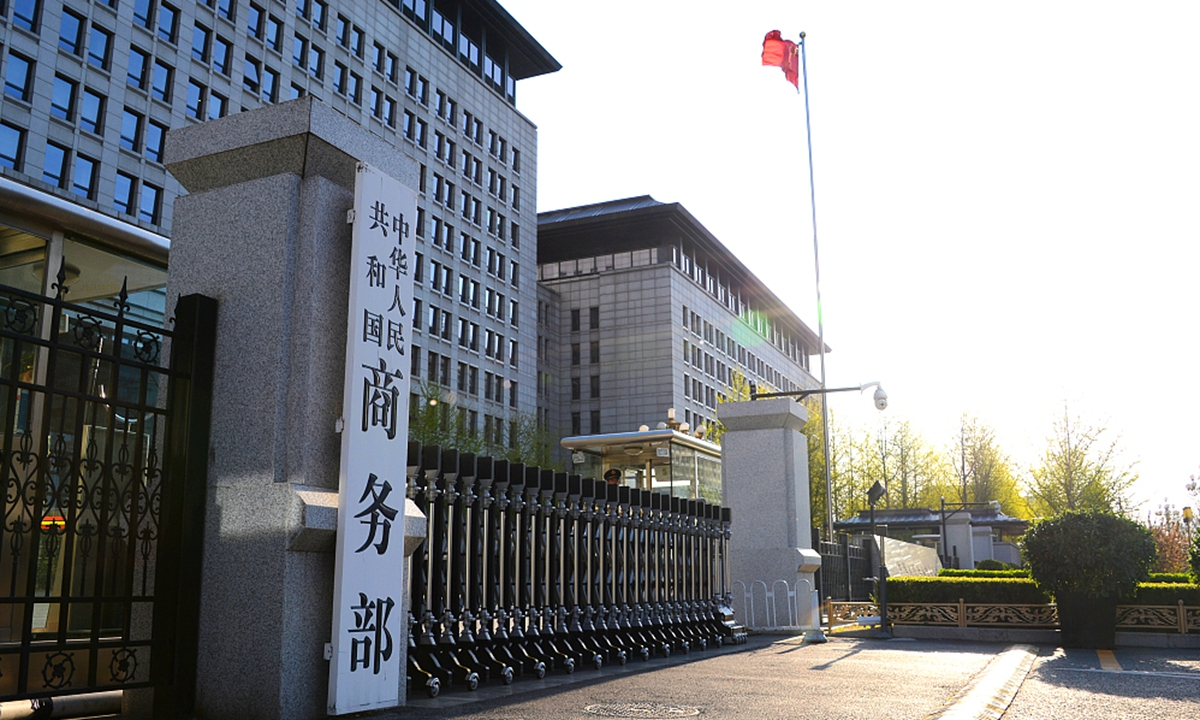
The Ministry of Commerce (MOFCOM) Photo: VCG
China’s Ministry of Commerce (MOFCOM) announced on Monday it would extend by six months its ongoing anti-subsidy investigation into certain dairy imports from the EU, citing the case’s complexity.
Given the complexity of the case, and in accordance with relevant rules of China’s anti-subsidy regulations, the MOFCOM has decided to extend the probe until February 21, 2026, the ministry said in a statement on its official website.
The investigation was launched on August 21, 2024, following a formal application by the Dairy Association of China and the China Dairy Industry Association on behalf of domestic producers, which argued that EU dairy producers benefit from unfair government subsidies. The probe also came after the Global Times learned exclusively, in last June, from a business insider that relevant Chinese industries were preparing evidence, as they planned to apply to competent authorities to launch an anti-subsidy investigation into imports of relevant dairy products from the EU.
In their application submitted last year, the domestic industry groups said that the bloc has provided substantial subsidies to its dairy-related industries. “A surge of low-priced EU dairy imports has dealt a serious blow to the production, operations, and financial health of Chinese producers, inflicting material injury on the sector,” said the application file.
Extending the probe period was a reasonable measure given its complex nature, allowing for more thorough analysis and accurate conclusions,” Zhou Mi, a senior research fellow at the Chinese Academy of International Trade and Economic Cooperation, told the Global Times on Monday.
Zhou said that EU policies on the dairy sector function at two levels — measures introduced by individual member states and regulations set at the bloc-wide level. “Coupled with the wide variations in competitiveness among EU countries in the sector, this makes the process of gathering evidence, conducting analysis and reaching a conclusion far more complex,” he noted.
The industry applicants claim that the EU and its member state governments have provided a total of 20 subsidy programs to companies in the EU dairy sector, covering multiple countries including Ireland, Austria, Belgium, Italy, and Croatia.
Zhou stressed that extending the deadline demonstrates China’s responsible approach in handling trade issues, saying that the country always bases its decisions on factual evidence and complies with relevant laws and WTO regulations.
The investigation focuses on certain dairy imports from the EU, including fresh cheese, processed cheese, blue-veined cheese and select high-fat dairy products, examining subsidies granted between April 2023 and March 2024 while assessing industry impacts over the broader January 2020-March 2024 period, according to the MOFCOM statement issued last August.
In February this year, when commenting on the progress of China-EU negotiations concerning electric vehicles as well as relevent investigations into EU pork and dairy products, MOFCOM spokesperson He Yadong stated that he anti-dumping investigation into pork imports from the EU and the anti-subsidy investigation into EU dairy products imports are currently ongoing.
China will approach these cases in an open and transparent manner based on Chinese laws and regulations and by following the WTO rules, He said, adding that the ministry will ensure that the rights of all parties are fully protected.
A MOFCOM official stressed again last September that China’s anti-subsidy investigation into EU dairy products was initiated in accordance with Chinese law and followed a domestic industry application. “China has a responsibility to safeguard the legitimate claims and lawful rights of its domestic industry,” according to the official.
Customs data revealed a steady increase in imports of the investigated dairy products, with a cumulative growth of 25.8 percent between 2020 and 2023, and an additional 11.3 percent year-on-year rise in the first quarter of 2024.
As a result, the profitability of China’s domestic dairy sector has fallen sharply compared with 2021. From 2020 to 2023, the sector’s operating rates hovered between just 10 percent and 50 percent, remaining at historically low levels.
“If subsidies are indeed found to exist, measures such as the imposition of anti-subsidy duties may be applied in accordance with relevant WTO rules,” Zhou said.
He stressed that properly addressing the investigation is crucial to maintaining and advancing China-EU economic and trade cooperation, further urging the EU to solve trade frictions with China with a scientific, rational, and objective attitude to achieve mutual benefits.